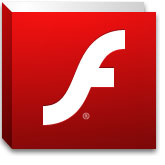 Yesterday, we started talking about using alternative content for flash for devices that don’t support flash.
Yesterday, we started talking about using alternative content for flash for devices that don’t support flash.
Today we’ll talk about a number of ways to give your audience the option to download and install the flash player if they don’t have it on their machine.
Let’s see what happens if your visitor doesn’t have flash player installed. In the case like that, you probably want to offer an easy way to download and install flash player. The traditional way for flash content relies on a non-standard method to download flash player to the machine.
The code looks like that:
<embed ... pluginspage="http://www.adobe.com/go/getflashplayer" />
This piece of code will result in the “puzzle” icon, when the flash player is missing.
Another piece of code like this one:
<object ... codebase="http://fpdownload.macromedia.com/pub/shockwave/cabs/flash/swflash.cab#version=8,0,0,0">
will result in this annoying message in IE, that most people don’t even notice.
 Adobe nowadays advises not to use these outdated methods anymore and offers an alternative ways.
Adobe nowadays advises not to use these outdated methods anymore and offers an alternative ways.
One of them is Adobe Express Install. This option uses a mechanism that’s built into flash player that allows you to update your flash player without navigating to the adobe website and downloading it.
 That’s the screenshot of a dialog box that appears, that’s how Express Install with update the flash player on the machine.
That’s the screenshot of a dialog box that appears, that’s how Express Install with update the flash player on the machine.
More on this topic in an excellent post by Bobby van der Sluis here:
Providing alternative content for SWF files by Bobby van der Sluis
Enjoy! 🙂
